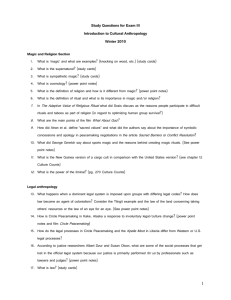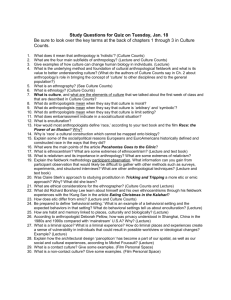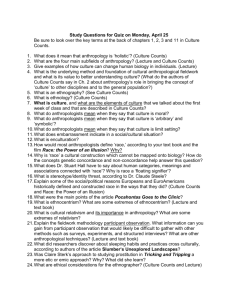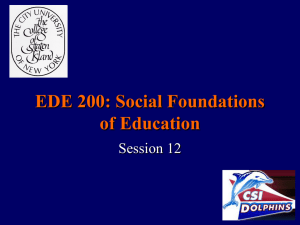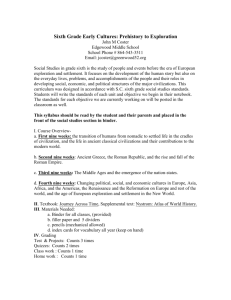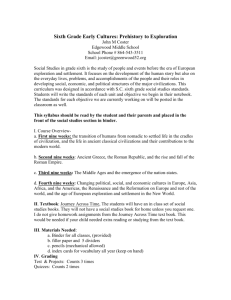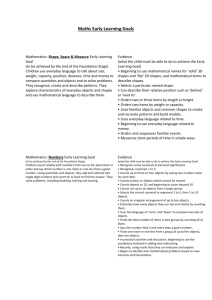Study Questions for final quiz
advertisement
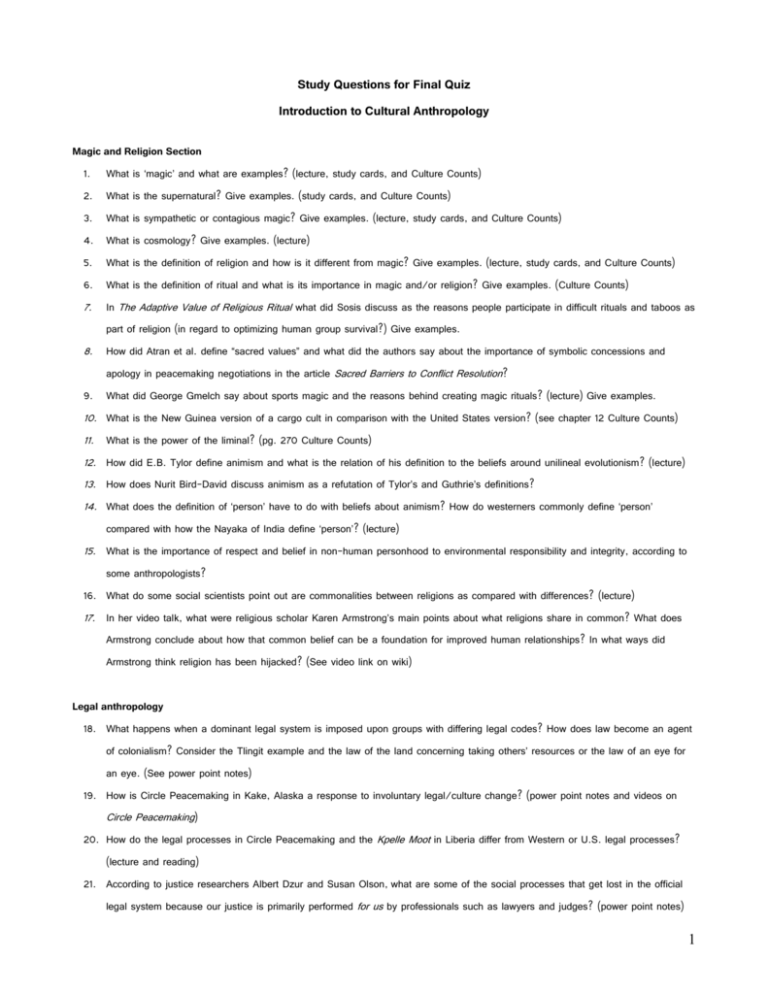
Study Questions for Final Quiz Introduction to Cultural Anthropology Magic and Religion Section 1. What is ‘magic’ and what are examples? (lecture, study cards, and Culture Counts) 2. What is the supernatural? Give examples. (study cards, and Culture Counts) 3. What is sympathetic or contagious magic? Give examples. (lecture, study cards, and Culture Counts) 4. What is cosmology? Give examples. (lecture) 5. What is the definition of religion and how is it different from magic? Give examples. (lecture, study cards, and Culture Counts) 6. What is the definition of ritual and what is its importance in magic and/or religion? Give examples. (Culture Counts) 7. In The Adaptive Value of Religious Ritual what did Sosis discuss as the reasons people participate in difficult rituals and taboos as part of religion (in regard to optimizing human group survival?) Give examples. 8. How did Atran et al. define “sacred values” and what did the authors say about the importance of symbolic concessions and apology in peacemaking negotiations in the article Sacred Barriers to Conflict Resolution? 9. What did George Gmelch say about sports magic and the reasons behind creating magic rituals? (lecture) Give examples. 10. What is the New Guinea version of a cargo cult in comparison with the United States version? (see chapter 12 Culture Counts) 11. What is the power of the liminal? (pg. 270 Culture Counts) 12. How did E.B. Tylor define animism and what is the relation of his definition to the beliefs around unilineal evolutionism? (lecture) 13. How does Nurit Bird-David discuss animism as a refutation of Tylor’s and Guthrie’s definitions? 14. What does the definition of ‘person’ have to do with beliefs about animism? How do westerners commonly define ‘person’ compared with how the Nayaka of India define ‘person’? (lecture) 15. What is the importance of respect and belief in non-human personhood to environmental responsibility and integrity, according to some anthropologists? 16. What do some social scientists point out are commonalities between religions as compared with differences? (lecture) 17. In her video talk, what were religious scholar Karen Armstrong’s main points about what religions share in common? What does Armstrong conclude about how that common belief can be a foundation for improved human relationships? In what ways did Armstrong think religion has been hijacked? (See video link on wiki) Legal anthropology 18. What happens when a dominant legal system is imposed upon groups with differing legal codes? How does law become an agent of colonialism? Consider the Tlingit example and the law of the land concerning taking others’ resources or the law of an eye for an eye. (See power point notes) 19. How is Circle Peacemaking in Kake, Alaska a response to involuntary legal/culture change? (power point notes and videos on Circle Peacemaking) 20. How do the legal processes in Circle Peacemaking and the Kpelle Moot in Liberia differ from Western or U.S. legal processes? (lecture and reading) 21. According to justice researchers Albert Dzur and Susan Olson, what are some of the social processes that get lost in the official legal system because our justice is primarily performed for us by professionals such as lawyers and judges? (power point notes) 1 22. What is law? (study cards and power point) Culture contact (voluntary and involuntary), colonialism and neocolonialism 23. What are types of culture contact changes? (study cards, handouts, lecture) 24. In general, what are various types of voluntary and involuntary culture change? (study cards, handouts) 25. What are some results of involuntary culture change? (study cards, handouts, lecture) 26. What are pathologies that manifest as a result of involuntary culture change? (study cards, handouts, lecture) 27. What is cultural reorganization? (study cards and Culture Counts) 28. What is cultural revitalization? (study cards, handouts, Culture Counts) 29. What are the main points about methods and results of forced culture change on Africans, Ngobe, Native Americans and others? (Films, lectures, Culture Counts) 30. What is colonialism? (pgs. 291-305 in Culture Counts, lecture, study cards) 31. What is the European colonial mindset that helped justify colonialism? (study cards and lecture) 32. What is neocolonialism? What are some examples? (study cards, lecture, Culture Counts) 33. What are the main points about the methods and purposes of colonialism in the film This Magnificent African Cake? (handouts, discussion questions, lecture) 34. Has colonialism ended? (power point notes and pgs. 315-322 in Culture Counts) 35. Why has independence from colonialism been such a difficult struggle for so many previously colonized cultures and countries? (lecture and pgs. 305 to 308 of Culture Counts, video Short History of Colonialism Uganda) 36. What is the definition of neoliberalism? What are examples as discussed in class? 37. What are the main points of the article The Price of Progress? 38. How do the ‘appetites’ of the developed world often affect the lives of people in many undeveloped places, such as the Ngobe lands in Panama, current mining operations that affect Mayan lands in Guatemala, and Africans, whose lands are coveted by wealthier nations for food growing? (lectures, video U.S. Coup in Guatemala, video Guatemalans’ views of mining, film Mining company view, handouts, discussion questions) 39. According to George Ayittey on Cheetahs Versus Hippos (video), how are the hippos linked to the colonial experience and how are the cheetahs linked more to traditional economic and political systems? 40. What did Ayettey say about traditional economic and political systems in Africa in contrast to current conditions and colonial conditions? How did he say people could help Africa? 41. How is Ayittey’s message similar to Father Oleksa’s message in the film Clash of Cultures and how is it different? 42. In addition, how would you describe colonialism from the perspective of historical genealogy? (lecture) 43. What were the main points Father Oleksa made in the film Communicating Across Worlds: Clash of Cultures about involuntary culture change, its results, and the possible solutions to the problems such change has instigated? (see film handout and discussion questions) 44. What did Father Oleksa and Canadian researchers point out about the patterns of involuntary culture contact that start out with the indigenous culture being put in a situation of dependence in relation to the dominant culture? (see film handout, involuntary culture change handout and power point notes) How did he say we could work to break the cycle? 45. Be prepared to apply Foucault’s “Historical Geneology” in regard to neocolonialism (lecture) 2 46. Be prepared to discuss the particulars of the book Two Old Women. Other basic concepts 47. What is enthocentrism and why is it an important concept in anthropology? 48. What is cultural relativism and why is it an important concept in anthropology? 49. Why is ‘race’ a cultural construction which cannot be mapped onto biology? 50. What is the primary technique for gathering data in cultural anthropology? 51. What are the main ethical considerations in anthropology? How might anthropologists’ experiences in Africa illuminate the importance of adhering to strict ethics? Most of Africa banned anthropologists from their countries after Africans declared independence from colonizers. Anthropologists had often been funded by colonial governments. Colonial governments often used anthropological findings to understand African societies in order to better assimilate, organize, and control them. How is this situation different from U.S. military use of anthropologists in Afganistan? 52. What is the Sapir Whorf Hypothesis/ 53. What is theory of mind? 54. What is the importance of categorization in language to our understanding or perception of the world? (lecture and Culture Counts) 55. What is the theory of cultural materialism? 56. What is the importance and function of kinship to social organization? 57. What is the difference between sex and gender? 58. Types of kinship descent: bilateral, patrilineal, matrilineal 59. What is the importance of economy to social organization? 60. Explain generalized reciprocity, balanced reciprocity, negative reciprocity, and redistribution as economic strategies. 3
